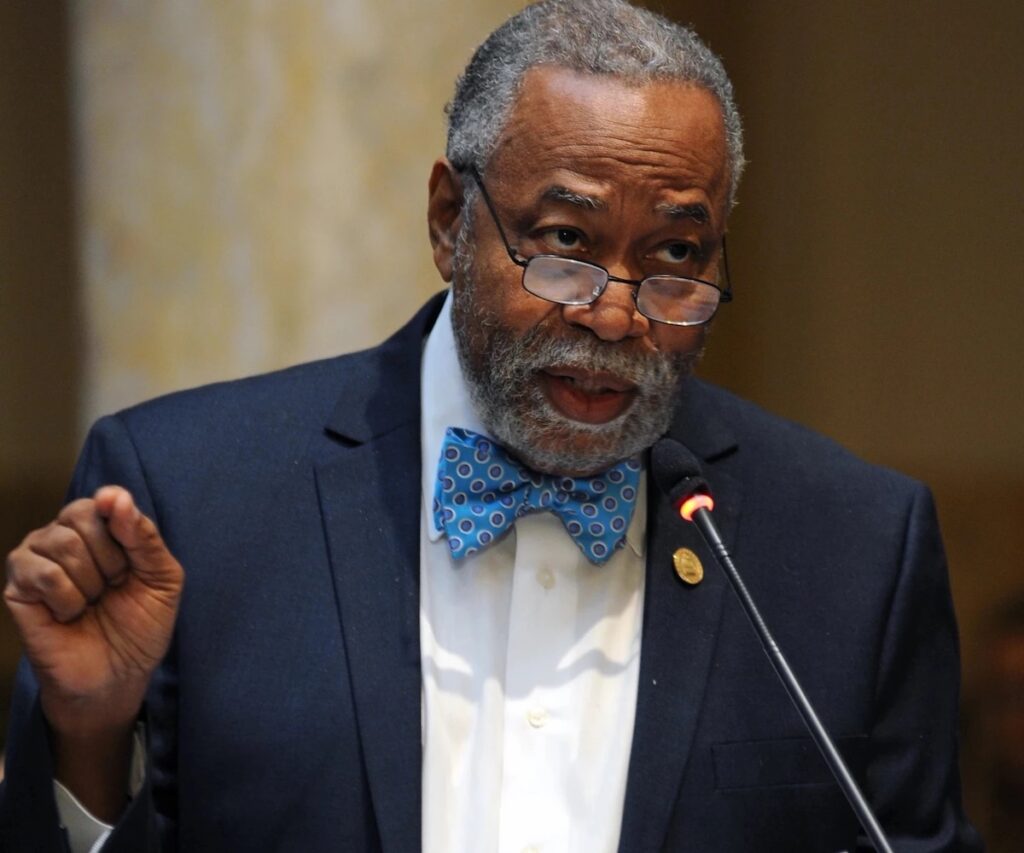Democratic Sen. Gerald Neal of Louisville has known about a glaring exception enshrined in the state’s Constitution for some time.
Kentucky is one of several states that amended its constitution to ban slavery and indentured servitude. But one group of people are explicitly left out of that ban — people convicted of a crime.
Neal has long considered introducing an amendment to the state legislature to ban slavery for every Kentuckian, he said. This upcoming session, he hopes he’ll finally be able to create momentum.

“It requires a reexamination of what we’ve done, what we’re doing now, and what’s the relationship with the past,” Neal said. “Because someone’s broken the law, does that give us control over their ability to produce value?”
Following the end of the Civil War, Congress amended the Constitution to formally ban slavery and indentured servitude across the country. Over the succeeding decades, many states followed suit with their own constitutional amendments including Kentucky — 26 years later.
But just like the federal one, the state constitution included one important exception: “Slavery and involuntary servitude in this State are forbidden,” it reads, “except as a punishment for crime.”
That exception, passed in the early days of the Jim Crow era, gave the state an obvious replacement for chattel slavery, according to David Childs, the director of Black Studies at Northern Kentucky University. Childs testified in front of a group of lawmakers last month that the exception is a historical root cause of mass incarceration as lawmakers across the South created laws designed to imprison newly freed Black slaves.
“The criminal justice system colluded with private planters and other business owners to trap, convict and lease Black people as prison laborers,” Childs said. “The legal basis was rooted in the exception language in the U.S. and state constitutions.”
Several other states have reevaluated their constitutional exceptions allowing for slavery in recent years. Over the last five years, seven states — including Tennessee and Alabama — successfully passed legislation removing the language from their constitutions, banning slavery in all its forms.
Republican Rep. Killian Timoney of Nicholasville, the co-chair of the Commission on Race & Access to Opportunity, said that when he was a teacher, students would bring the exception up frequently, but it wasn’t until the past year or so that he decided to take action. He said that when another parent from his son’s basketball team asked him to do something about Section 25, he took it as a sign.
“The good Lord has a way of providing signs throughout our lives to help us along with things,” Timoney said. “For me, that was the sign. From that point forward, I made it a personal agenda item to continue to research [Section 25].”
Timoney said he too believes now might be the time, with other Republican-majority states — like Tennessee and Alabama — successfully taking up the cause.
In order to become law, a constitutional amendment has to be approved by three-fifths of each legislative chamber and a majority of Kentucky voters during a referendum.
Although the proposal would fully abolish slavery in Kentucky, it would not automatically change Department of Corrections policy or inmate pay. That’s what happened in states like Colorado, which was the first state to pass an amendment in 2018, where incarcerated people still face work requirements and punishments for not carrying out assignments.
Childs of Northern Kentucky University said extremely low prison pay and the exploitation of prison labor for profit continues in Kentucky.
“You can name a number of companies that benefit from prison labor, especially the private prison industry, where they pay the convicts so little — a few dollars, sometimes a few cents a day,” Childs said.
According to Kentucky Department of Corrections policy, some incarcerated people make as little as $0.24 per hour or only $0.12 per hour if they also receive a time credit off their sentence.
Amending the state constitution wouldn’t change that, Neal said, but it could open the door to future legislation and provoke more prison reform. Neal also said he believes it is the duty of the legislature to remove all traces of slavery and Jim Crow Era policy from active state law.
“The specific issue here is whether or not we should have a system that’s tied to our history of slavery,” Neal said. “The fact of the matter is, we need to take a very hard look at that and look at our values as a society.”
Kentucky’s Republican supermajority has been resistant to taking up measures to reverse or acknowledge the lingering effect of slavery on modern day Kentuckians. In 2022, lawmakers passed a bill that limited how public school educators can teach about race in the classroom. The bill said that “defining racial disparities solely on the legacy of [slavery and Jim Crow] is destructive to the unification of our nation.”
Attica Scott, a former Democratic state representative and activist, said that in many ways the same disenfranchisement and oppression that slaves endured was often transferred to people convicted of crimes, who were disproportionately Black.
Given that history, Scott said she wouldn’t be surprised if supportive legislators faced an uphill battle passing the bill to wholly eliminate slavery in the state.
“I know the state legislature is mostly white people, mostly men who don’t care about people who were enslaved and their descendants,” Scott said. “They don’t care about removing something from our constitution that is so inherently a reminder of the plantation in the South, and a time when there was power, domination and control over Black bodies.”
While the majority of recent ballot measures to ban forced prison labor have been successful, there is one notable exception. Out of five such initiatives, only the proposed amendment in Louisiana failed last year — and by more than 20 points. Democratic lawmakers who initially supported the amendment withdrew their support after it was put on the ballot, saying confusing language watered down the original meaning.
Kentucky lawmakers during last month’s legislative meeting warned against making similar mistakes. Neal’s current proposal keeps it simple — simply remove the exception and allow Kentucky’s ban on slavery and indentured servitude to stand on its own.
Although Neal doesn’t think the amendment is likely to have any immediate effects on prison policy, he said it is one piece in the puzzle to ameliorating the state’s mass incarceration problem.
“It raises a plethora of other issues as to how we not only run our systems, but [how] other systems that feed off of our prison system operate,” Neal said. “It opens up the whole spectrum of change, or at least the potential for change. And I think it’s long overdue.”






